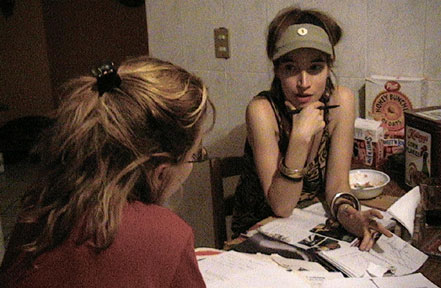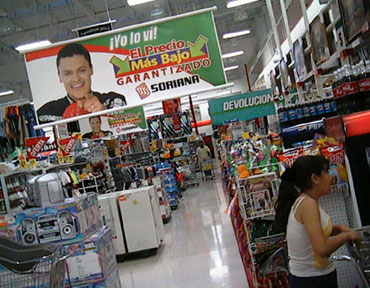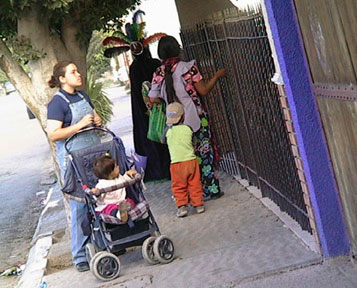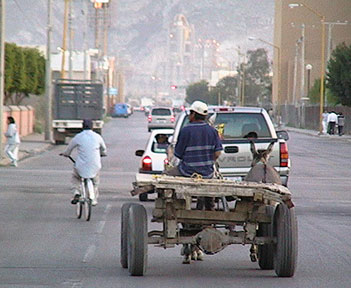Febuary 24, 2003
Torreon, coahuila, Mexico
11:52pm. I'm at the home of my friend Claudia, a professor from Venezuela teaching here at Tec de Monterrey. Her specialty is critical thinking, and she's working on methods of self-learning. I've visited twice passing through Torreon. Michel Vautour from Saint John was living in this house with Claudia, but he is now teaching in Tampico, Mexico. I'd originally found this scene because I'd got word that Brad, who I'd gone to kindergarten and high school with was teaching here at a private elementary school. This past fall he was murdered in a robbery while teaching in Costa Rica.
Working on a seminar to inspire local teachers, Claudia asked Seed and I for suggestions. "People need to see how big issues effect them personally," Seed said. "Often we are just over-whelmed by the politics of huge problems. Everything is politics: where you shop; what you buy; what you stand up for; what you don't -- your silence."
I mentioned an idea from John Tayor Gatto's book Dumbing Us Down, about how school shouldn't be preparation for life, but life itself: the experience of living. Youthful energy is best spent in the community where it is needed-- providing pesticide-free food for through gardening, building affordable housing, dealing with waste and recycling, caring for elderly and mentally ill. In touch with one's community and the land where it is rooted, people grow understanding where resources are located or lacking and how everything thing is connected.

The problem with public education has little to do with reading and math, and more to do with attitude and values. People care far more about their own social status than they do about the well-being of the entire community. It is especially obvious here in Mexico where there is a huge divide between rich and poor. Life is tough; it's survival of the fittest. You are battling with your neighbors for the highest paying job and most attractive spouse. Social class is well established through cars, clothes, schools, professions, and social circles. To change this mind-set we need to see that what others do effects us too and that it is in our interest to invest in the common wealth.
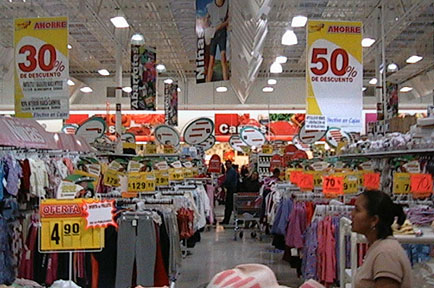
The Rhizome Collective is a good example of this-- a non-hierarchal network of people that skill share everything from legal aid to bicycle maintenance. There are no leaders, just common goals and people who use initiative, so if anyone drops out, the network continues to survive -- like the internet. A rhizome is a root system that spreads out and sends up shoots. Each individual part of the plant has the potential to be relocated to start a new system. These systems are very difficult to uproot because they form a vast connected network.
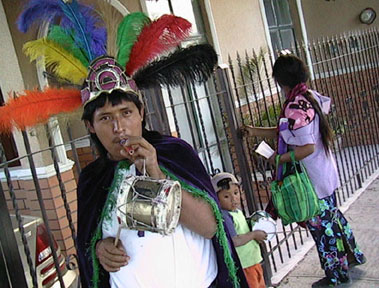
This is the way our communities can be, and it happens when organizations get people in touch with one another. An organization currently in place in every community is the public school system. Schools can be community centers open 24 hours for people of all ages, and without grades, which promote competition and dividing social status. Some might call this socialist, communist, utopian... as if these were bad words. What else is worth working toward? What we have now are rich and poor. Those with resources and access to opportunities and those who have not. Why? I believe it is because the masses are wasting their precious time watching glamorous and horrific fantasies on flickers screens, the main stream media which is everything from billboards to newspapers are commercial tools that promote consumption to keep the economy rolling.
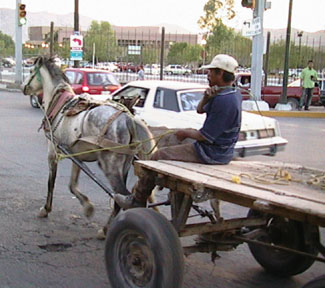
A shift in perspective is needed, from: I'm gonna get mine... to: I want to live in a clean, safe, healthy community where people care about each other and it doesn't cost a lot to live. I want to empower myself and others by contributing to my community. I want to learn new skills, so I can continue to survive and contribute no matter where I go on the planet. It's about values. Do I value my time? Do I value life health? What do I want to spend my life doing? Where do I want to go? Life is short -- like a blink in a eye of infinity. And yet, so much has changed on this planet in such a short amount of time. We must think of furture generations.
I am a native of the North American continent. I am loyal to no country's government. I have deep roots in Canada, USA and Mexico. Borders are imaginary lines. I crossed from Canada to USA in seconds with the flash of my drivers license, and crossed into Mexico with a green light and nobody said a word to me.
This is a fairy tale to many. "It is very difficult for a Mexican to get an American tourist Visa," Claudia explained. "Mexican families receive far more money from illegal persons working the US than the Mexican economy does from all it's tourism. And border security all over the world is getting tighter." Globalization "frees" trade(cheap labor and goods), not people. "What if 4 million Mexicans wanted to go to Canada?" Claudia asked. "Should you let them? Canadians want to protect there jobs." I don't want to be the person to say "no" to those in need. People are people to me. I do not own the land and Canada has lots of it, and resources, most importantly water, but the answer is not should people move, but how can we make it work where they live. Again, it comes down to having a system that works. Getting people organized, involved and educated. Claudia said that only one in ten thousand students from the Mexican public education system becomes a scientist.
Last night, I called Blanca, a bright and motivated girl that introduced herself to me three years ago after I spoke to her class at Colegio Ingle's. Since then we've stayed in contact through email. She is high school at Tec de Monterrey and doing exceptionally well, recently winning a city wide honor to participate in a national competition for ideas to improve tourism. She and a date were heading to the movies, so she invited Seed and I to join them. The Cinema was in a huge sparkling new shopping mall, very strange after passing through nothing but dirty little shanty towns all day.
"Downtown is dead...," Blanca said.
"Its dead?!" I returned.
"Almost..." she continued. "For me going down town is weird. For the people who work for my mother and people like that... they go down town everyday." The movie, English with Spanish subtitles, cost $40 pesos, equivalent to $4US. I asked it was affordable for most people. "The people who work for my mother will never go to the movies," Blanca answered. "Its the same as a day's pay, and they have more important things-- like mouths to feed. The least you can pay is 4 pesos an hour the ladies at my mother's restaurant make a bit more than that."
Blanca volunteers at a shelter for girls ages 4 to 14, helping with homework. One of the girls is there because her parents moved and didn't tell her where. "The conditions are bad there too," she said. "I mean really gross-- like paint peeling off the walls. It really makes me appreciate everything I have."
"The more you know, the more you have to give," Blanca began speaking about the responsibility of the educated, which reminded me of the Native American belief that the wealthiest person in the village is not the one with the most, but the one who gave the most.
"What do you think people need to know?" I asked Blanca. She put out her hand and spread fingers, pointing out that each is like a path, or a point of view focused in a different direction: to happiness, sadness, injustice, poverty, wealth, etc. ...and that when a person is focused on happiness, then they become unaware of sadness and injustice. And when sad, they don't see all that is happy. It is best, she suggested, to stayed centered -- to be aware of all paths and perspectives. The problem with students at her school, she said, is that they live in a bubble -- never seeing the poor side of town.
Angela Valenzuela, an prof at UT Austin, has a mailing list that gives updates on reforms in public schools, and this is one of the articles she's sent recently:
Nervous kids, schools face TAKS this week -
Thousands expected to fail new examBy ZANTO PEABODY @ Houston Chronicle
The good news is that when the state unveils the Texas Assessment of Knowledge and Skills on Tuesday, it initiates an era of higher measured standards for 2.5 million students. The bad news is that thousands of those students are expected to fail the test that for third-graders determines if they pass to the fourth grade.
"It's like every student is in a suspense movie," said Denise Rice, mother of a Rees Elementary student in the Alief Independent School District. "Everybody knows something is going to happen, but nobody knows what."
The TAKS has been billed as the bigger, badder version of its predecessor, the TAAS. The Texas Assessment of Academic Skills measured the minimum skills a student is expected to have at a certain grade level, but TAKS is supposed to measure the higher end of the spectrum.
This year, third-graders will pass or fail the grade depending on their reading scores. In coming years, the TAKS will decide if fifth- and eighth-graders get promoted to the next grade. This year's sophomores will become the first required to pass the TAKS to graduate.
Test makers added science and social studies to the standard reading and math portions. More than gauging whether students can guess the answer, the TAKS measures how much they know about their answers. For example, a sample TAKS question lays out details about a child's pets but doesn't give their ages.
"How old is each animal?" the test asks. "Explain your process."
Proponents say the extra requirement of more accurate explanations measures how much a child knows. A student running out of time can no longer fill in box "C" straight down an answer sheet and get some right.
A third-grader who fails the reading test still has a chance to advance. He can take up to three retests. If the child still fails, a committee of his parent, his teacher and an administrator will review the student's progress and can decide to pass him.
Like the TAAS, the TAKS will be used alongside other factors such as dropout and graduation rates to determine a school's and a district's academic rating -- from unacceptable to exemplary -- although the Texas Education Agency will not count this year's scores.
Even so, schools rolled out a litany of study aides, pep rallies and extra classes. In Humble, parents got homework assignments to read to their kids. Houston schools offered information to parents on how to ask their children TAKS-style questions, such as, "What do you think will happen next?" Schools intertwined TAKS lessons and field trips.
A trio of dancers rallied students last week at Hartsfield Elementary with an interpretation of the inspirational ballad I Believe I Can Fly. Offstage throughout the routine, mother Marica Woods coached her third- and fourth-grade daughters, Viviana and Espidonza.
Woods said she paid as much attention in preparing her daughters for the test.
"The school had brought the parents in for meetings since last year," she said. "My kids did well on the TAAS, but I am not sure they will do so good on the TAKS. They keep telling us it's going to be a lot harder and people are going to fail."
Parents, teachers, even school districts share Woods' anxiety. A TEA analysis of last year's TAAS scores predicted a third of the state's third-graders would have failed the TAKS. The ethnic breakdown is more grim. Forty percent of Hispanic and half of African-American third-graders would fail if they performed at the same level as last year's students.
Some local ministers have taken issue with the test because, they say, it seems destined to hold back minority kids.
"Somebody is designing tests to make black and brown kids feel bad about themselves," said the Rev. S. J. Gilbert, president of the Houston Metropolitan Ministers Conference.
The Rev. Michael P. Williams, senior pastor of Joy Tabernacle Church and a trustee of the Houston Community College District, said students should be judged more holistically on progress made over years rather than at an arbitrary starting point.
"I would be the last to say there is some inherent deficiency with minority kids," Williams said. "The problem has more to do with the environment, even the pathology, of their home lives. They're starting the race 20 meters behind with a ball tied to their leg."
Not everyone in minority communities holds those opinions. Houston Independent School District board member Kevin Hoffman said the test may hurt some with low scores in its initial year but the higher standard will push minority grades upward in the coming years.
"We can't go into this thinking it's designed to target a segment of the population," Hoffman said. "That's the same argument that was made when we started giving the TAAS, and every year, we've done better."
Parents and educators have had some warning. A bill signed in 1999 by then-Gov. George W. Bush established the must-pass rule for this year's third-graders. HISD, as a result, ended social promotion two years ahead of the rest of the state. Just as Texas was at the forefront of establishing standards like no-pass, no-play in the 1980s, Houston schools have been out front on firm testing standards.
Schools statewide also have incorporated the core TAKS subjects into their curriculum.
"There will be some disappointments," Hoffman said. "This is as much a test of how well we prepared for the unknowns as it is a test of our students."
"In the last email my mom said have fun honey and make a difference. She understands what I'm about." -Seed
